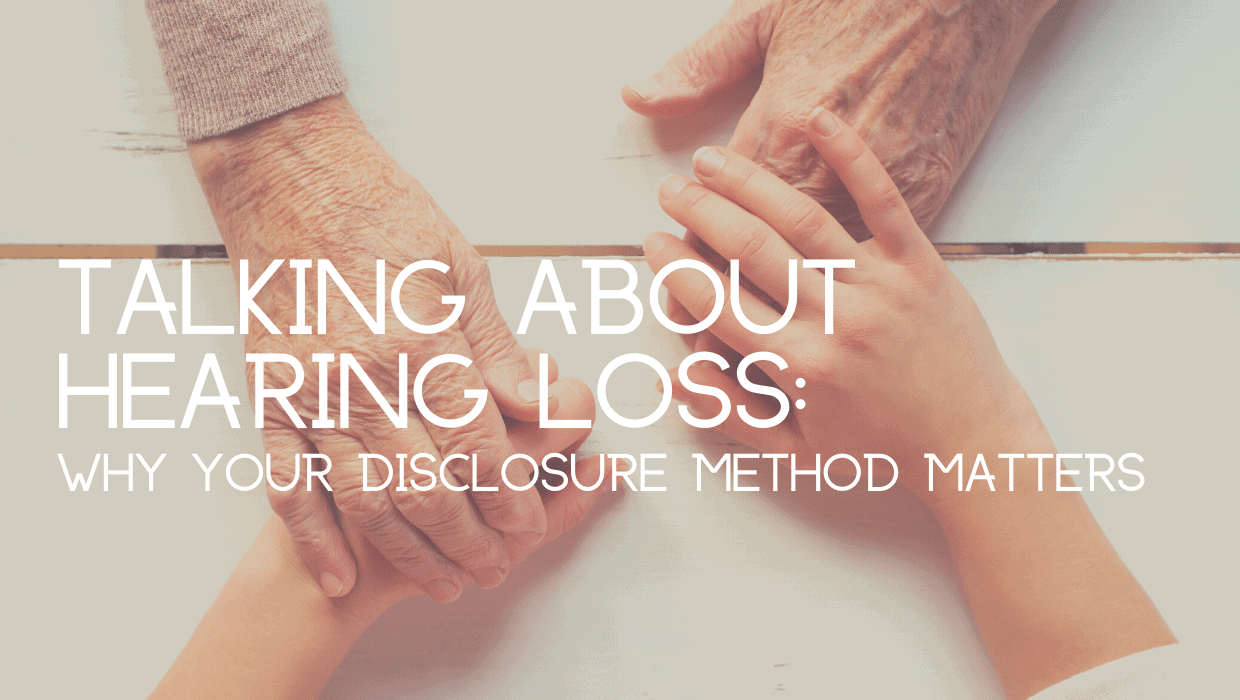- The Future of Hearing Health Research: Promising Breakthroughs - April 18, 2024
- Hearing Health in the Classroom: Strategies for Teachers and Students - April 6, 2024
- The Power of Bluetooth: A New Chapter in Hearing Aids - March 26, 2024
If you’ve recently been diagnosed with hearing loss, you may still be experimenting with ideas about disclosure. Many people who are not yet comfortable with their hearing loss and are likely not using hearing aids may prefer to avoid talking about it at work or in social situations.
While this is among the common responses to a new hearing loss, you may find you have better outcomes with direct, multipurpose disclosure.
A Study on Disclosure
A study at Massachusetts Eye and Ear from 2015 asked 337 survey participants to supply some common phrases they might use when letting another person know they have hearing loss, and what types of reactions they usually received. The researchers then determined that all the self-reported disclosure phrases fell into three main types:
- Non-disclosure
- Basic disclosure
- Multipurpose disclosure
Non-disclosure is just what it sounds like. Those employing this method don’t say anything about their hearing loss when they’re conversing with people. When they have trouble hearing something, they tend to resort to the same types of phrases that people with normal hearing use when they need something repeated, such as, “I didn’t catch that; can you say it again?”
Basic disclosers will announce that they have hearing loss, and will perhaps tell their conversational partner how they came to have it or other details, like the types of situations in which it causes the most trouble.
Multipurpose disclosure entails communicating that you have hearing loss, and letting the other person know a thing or two they can do to help you hear them better. An example of multipurpose disclosure might be, “I’m a little hard of hearing; would you mind facing me when you speak?”
Multipurpose Disclosure Is Best
The study found that those who employed multipurpose disclosure reported having much better experiences. They found that people were willing to help, support and accommodate them most of the time. It is also noteworthy that women were twice as likely as men to employ multipurpose disclosure and to report being satisfied with others’ reactions to their disclosure.
Since multipurpose disclosure has such a high rate of success, the researchers recommended that hearing healthcare providers make the strategy known to their patients.
Suggestions to Include in Your Multipurpose Disclosure
Some suggestions for conversational partners that many people with hearing loss find helpful include:
- Could you add a little extra space between your words?
- Please speak a little louder, but don’t shout.
- Do you mind facing me when you speak?
- Please don’t cover your mouth.
- (Rather than asking for something to be repeated) Can you say that in different words, please?
- Always make sure you have my attention before you start talking.
- Can we reduce the background noise a bit? (Turn down the TV or radio.)
- Can we move to a quieter spot to talk?
- Can we find a place that’s lit a little brighter?
Disclosure at Work
If you’ve been at your job for a long time and are starting to experience hearing loss, it’s best to disclose this fact to your employer. You’ll need to get your hearing tested (which you should do once a decade until age 50 and once every three years after that, anyway), but once there is a record of your hearing loss you are covered under the Americans with Disabilities Act. Your employer has a responsibility to make reasonable accommodations for your hearing loss. You should do some research into what some of those accommodations might be and have a frank discussion with your employer about the kinds of things that will be possible.
If you are applying for a job and you have hearing loss, most people who responded to a survey said hearing loss is best disclosed at the job interview.
Hearing Aids
If you do have hearing loss and are not currently treating it with hearing aids, you should do so. More and more evidence indicates that hearing loss is not just an annoying problem but can signal the beginning of a cascade of negative health outcomes including fatigue, brain atrophy, earlier onset of cognitive decline and dementia, significantly increased risk of accidents, loneliness and social isolation.
With the right set of hearing aids, you might find yourself needing no accommodation under normal circumstances. They’ll help you stay healthy, independent and happy for years to come. Contact us today to schedule an appointment for a consultation and hearing test.

